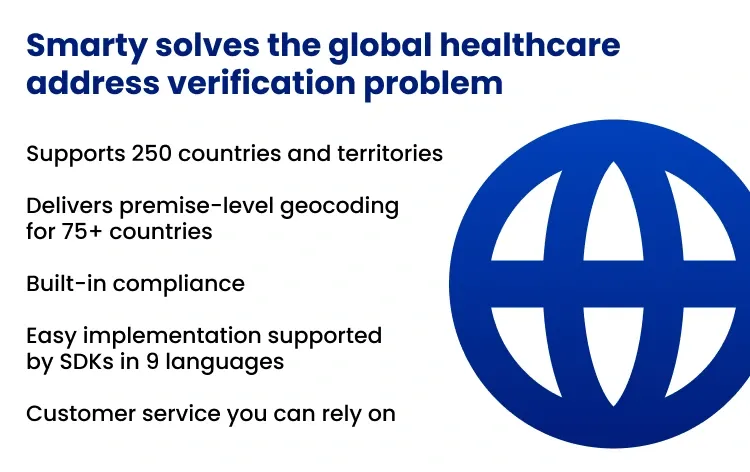Solving the global healthcare address verification problem


International healthcare is complex. Inaccurate or unverifiable international addresses make it worse by delaying claims, increasing compliance risk, opening the door to fraud, and frustrating members.
Healthcare companies need global healthcare address verification that’s scalable. Here's how to get there.
Why global address verification is especially complex for healthcare companies
Healthcare depends on addresses. While just one datapoint, addresses are foundational to so many critical healthcare management processes and vital to get correct. So many workflows rely on precise, up-to-date location data.
Regulations like HIPAA, GDPR, and KYC/AML require private, auditable, and accurate address information, especially across borders. Incorrect addresses cause misrouted PII, bills, and EOBs, missed appointments, and frustrated patients. Bad address data slips through fraud detection and prevention systems without quality address verification and slows down provider directory management.
Plus, there are 250 countries and territories, and by extension, there are 250 foreign address formats, and there is no single, global standard. Wondering how to format any address in the world? Check it out by country.
Many regions use non-Latin scripts. User-submitted addresses often contain typos or local quirks. U.S.-centric validation systems frequently misinterpret foreign formats. Political changes and evolving postal data further complicate things.
It’s no wonder that healthcare and health tech organizations struggle to get it right. Address quality affects a variety of touchpoints in healthcare, but when you put them on a global scale, without a global address verification process in place, healthcare address data can become a hot mess.
Real-world applications for healthcare companies
Regulatory stakes

Address data affects your compliance posture. HIPAA, GDPR, and KYC/AML regulations hinge on accurate, private, and auditable information. Especially when data crosses borders, poor verification increases the odds of noncompliance.
Member communication and care coordination
A mistyped street name can mean a delayed Explanation of Benefits (EOB), or worse, a missed appointment. Accurate addresses ensure labs, medications, and provider communications reach the right people on time.
International shipping
When you're shipping medications, medical devices, or anything healthcare-related, a bad address can cost you big time. Exactly how big? That depends on your specific variables like shipping volume, package value, and customer retention costs. Use our ROI calculator to see how much failed deliveries are draining your resources—and how investing in reliable address verification can turn the tide.
Claims and payments
Processing international claims with bad addresses results in payment delays or outright denials. That’s a surefire way to spike costs and irritate members. Implementing global healthcare address validation can help you catch and correct misspelled address components.
Fraud detection and risk scoring
Your fraud analytics engine is only as good as your data. Garbage addresses create gaps in member identity validation, risk profiling, and anomaly detection that can have serious financial implications for your institution.
Provider networks
Healthcare companies increasingly manage global provider directories. The Centers for Medicare and Medicaid Services (CMS) found that 45.1% of provider directory locations listed in online directories were inaccurate. One health plan listed a single provider 333 times in its database when in reality, it was only one doctor. You need reliable address validation across international clinics, facilities, and pharmacies.
What healthcare companies need in a global address verification solution
To win at global healthcare address validation, your tool needs to handle way more than just formatting. You need a provider and tool with:
- Multilingual format support. Handle global schemas, from Tokyo to Timbuktu.
- Normalization and transliteration. Convert native scripts to Romanized formats (and back).
- Real-time validation. Catch errors as addresses are entered—at onboarding, in member portals, or internal CRM forms.
- Batch processing. Clean your legacy systems and claims data warehouses to catch every address change or ZIP Code redistribution.
- Compliance-ready infrastructure. Privacy, auditability, and PII protection must be baked in for ultimate compliance. Built-in monitoring, logging, and audit capabilities will make a great data provider stand out.
- Easy implementation. With already complex networks, healthcare organizations need to be able to integrate global address verification with ESBs, CRMs, and MDM platforms seamlessly. Developers shouldn’t need additional schooling to set it up.
- Responsive, expert support. If you get tripped up along the way, having a team of unscripted, friendly humans to help you with your needs on the same day you have them is critical.
How Smarty solves the global healthcare address verification problem
Smarty offers a robust International Address Verification service. We enable you to verify in bulk or in real-time. Our API is built for global healthcare scaling and complexity.

- Supports 250 countries and territories.
- Handles Unicode and transliteration automatically.
- Delivers premise-level geocoding for 75+ countries.
- Works in real time and in batch workflows.
- Built-in compliance: Encryption en route.
- Easy implementation supported by SDKs in 9 languages.
- Customer service you can rely on.
With Smarty, you can validate member-submitted addresses at onboarding, enrich provider data, and eliminate legacy errors—all in a HIPAA- and GDPR-aligned architecture.
Future-proofing global address intelligence
Healthcare is global, and your data stack needs to keep up.
Bad addresses are a risk vector, and when international operations grow, the cost of doing nothing grows too.
With Smarty, you’re not just cleaning data. You’re creating a competitive advantage in care coordination, compliance, and member satisfaction.
Ready to fix your international address issues?
Try us free, book a consultation, or request a demo with Smarty’s enterprise team today. Let us help you deliver global healthcare with precision, accuracy, and peace of mind.


